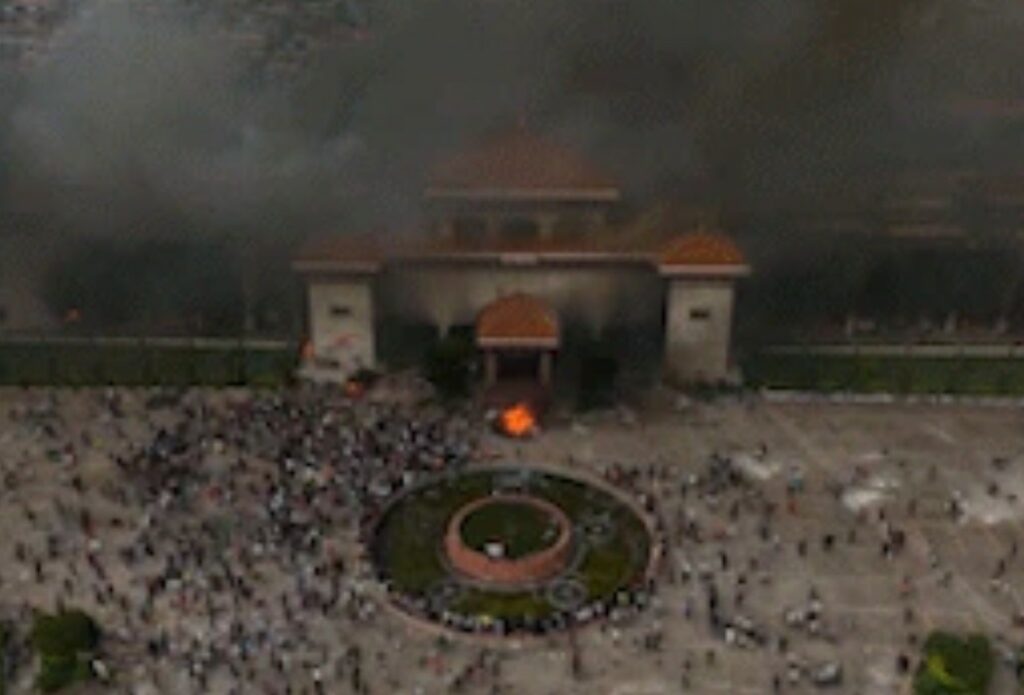
Con una drammatica inversione di tendenza, il Nepal ha revocato il blackout nazionale sui social media imposto la scorsa settimana dopo che aveva scatenato massicce proteste giovanili e causato almeno 19 morti, secondo i media locali.
La decisione è stata annunciata l’8 settembre dal Ministro delle Comunicazioni e dell’Informazione Prithvi Subba Gurung, che ha affermato che il governo stava rispondendo all’indignazione pubblica e alla tensione nelle strade. Il governo ha inoltre promesso di pagare le cure delle vittime e ha istituito un comitato per indagare sulle cause della tragedia e presentare proposte entro due settimane.

Il blocco ha interessato 26 piattaforme, tra cui Facebook, Instagram, YouTube e X. Le restrizioni erano una diretta prosecuzione della direttiva del 25 agosto: alle piattaforme straniere era stato ordinato di registrare le proprie attività in Nepal e di nominare un rappresentante locale entro sette giorni.
Poiché la maggior parte delle aziende ha ignorato la scadenza, l’accesso ai servizi è stato disattivato la scorsa settimana. Alcune piattaforme non sono state bloccate: TikTok e Viber hanno rispettato i requisiti prima della scadenza e sono state aggiunte al registro.

La cancellazione ha coinciso con il giorno più intenso delle proteste. L’8 settembre, migliaia di persone, molte delle quali adolescenti in uniforme scolastica, hanno riempito le strade delle città di tutto il paese, chiedendo l’accesso ai social media. Le proteste sono degenerate in scontri con le forze di sicurezza; almeno 19 persone sono state uccise e oltre un centinaio sono rimaste ferite, secondo i media nepalesi.
Con l’intensificarsi dei disordini, il Primo Ministro KP Sharma Oli ha affermato che i disordini erano alimentati da “persone esterne”, ma ha sottolineato che il governo non ha respinto le richieste della nuova generazione ed è pronto al dialogo.
Mentre le forze di sicurezza radunavano rinforzi, incendi e manifestazioni violente si sono verificati in città nei pressi di edifici governativi e residenze di politici di alto rango. Secondo quanto riportato dai media locali, i manifestanti sono entrati nel territorio del complesso parlamentare e hanno distrutto edifici lungo la linea di scontro con i partiti al potere.
Anche i feed delle pubblicazioni indiane e nepalesi hanno registrato episodi operativi, dall’evacuazione di funzionari da parte di elicotteri dell’esercito al coordinamento di colonne di manifestanti su piattaforme di messaggistica e chat di gioco. In particolare, alcuni degli inviti all’azione sono stati diffusi tramite Discord e, in serata, un esercito era al lavoro nei pressi del quartiere ministeriale.
L’impatto politico è stato immediato. Prima si è dimesso il Ministro degli Interni Ramesh Lekhak, poi il Primo Ministro KP Sharma Oli, sotto pressione sia dalla piazza che dai suoi alleati della coalizione. Nel mezzo dei disordini, l’amministrazione di Kathmandu ha chiuso l’aeroporto internazionale di Tribhuvan e cancellato tutti i voli, citando rischi per la sicurezza senza precedenti.
La decisione del governo è stata criticata dalle organizzazioni internazionali. L’Alto Commissariato delle Nazioni Unite per i Diritti Umani ha ricordato alle autorità nepalesi la necessità di garantire la libertà di riunione pacifica e di espressione. Amnesty International e altre organizzazioni per i diritti umani avevano avvertito, ancor prima della chiusura dei social, che i filtri di massa e le risposte violente alle proteste compromettono le libertà civili fondamentali.
Nonostante lo sblocco dei social network e il cambio di primo ministro, la fase di tensione non è ancora finita. A Kathmandu, le restrizioni alla circolazione permangono, la polizia e l’esercito presidiano gli snodi chiave e gli attivisti stanno preparando eventi di lutto e chiedendo risposte alle domande sulle morti e sul futuro della regolamentazione delle piattaforme online.
La vicenda del blocco si inserisce nel più ampio tentativo di Kathmandu di inasprire le regole per le piattaforme digitali. In primavera, il governo ha presentato un disegno di legge sui social media, ancora in attesa di approvazione.
Il documento prevede multe e pene detentive per le pubblicazioni che le autorità ritengono “contrarie alla sovranità o agli interessi nazionali”. La Federazione Internazionale dei Giornalisti ha descritto l’iniziativa come una minaccia alla libertà di stampa e all’espressione digitale.
Il pensiero di Red Hot Cyber va alle 19 vittime e ai loro cari.
Ti è piaciuto questo articolo? Ne stiamo discutendo nella nostra Community su LinkedIn, Facebook e Instagram. Seguici anche su Google News, per ricevere aggiornamenti quotidiani sulla sicurezza informatica o Scrivici se desideri segnalarci notizie, approfondimenti o contributi da pubblicare.

 Cybercrime
CybercrimeLe autorità tedesche hanno recentemente lanciato un avviso riguardante una sofisticata campagna di phishing che prende di mira gli utenti di Signal in Germania e nel resto d’Europa. L’attacco si concentra su profili specifici, tra…
 Innovazione
InnovazioneL’evoluzione dell’Intelligenza Artificiale ha superato una nuova, inquietante frontiera. Se fino a ieri parlavamo di algoritmi confinati dietro uno schermo, oggi ci troviamo di fronte al concetto di “Meatspace Layer”: un’infrastruttura dove le macchine non…
 Cybercrime
CybercrimeNegli ultimi anni, la sicurezza delle reti ha affrontato minacce sempre più sofisticate, capaci di aggirare le difese tradizionali e di penetrare negli strati più profondi delle infrastrutture. Un’analisi recente ha portato alla luce uno…
 Vulnerabilità
VulnerabilitàNegli ultimi tempi, la piattaforma di automazione n8n sta affrontando una serie crescente di bug di sicurezza. n8n è una piattaforma di automazione che trasforma task complessi in operazioni semplici e veloci. Con pochi click…
 Innovazione
InnovazioneArticolo scritto con la collaborazione di Giovanni Pollola. Per anni, “IA a bordo dei satelliti” serviva soprattutto a “ripulire” i dati: meno rumore nelle immagini e nei dati acquisiti attraverso i vari payload multisensoriali, meno…